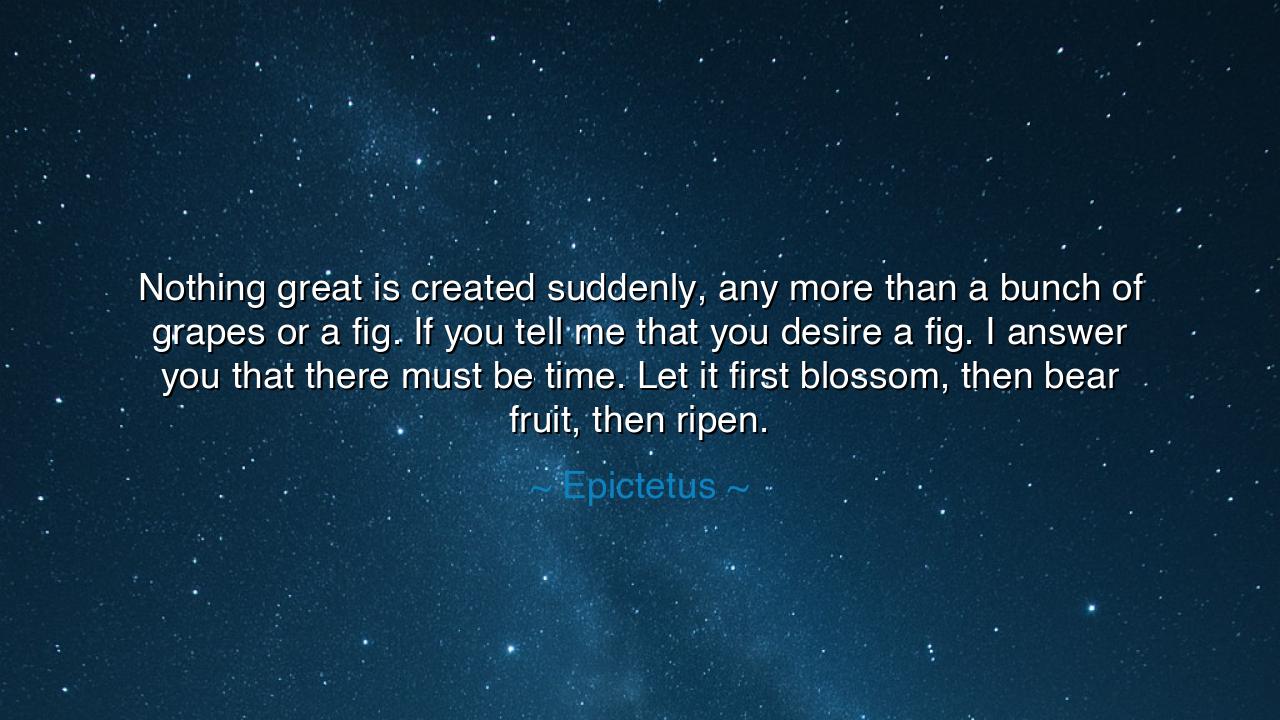
Nothing great is created suddenly, any more than a bunch of
Nothing great is created suddenly, any more than a bunch of grapes or a fig. If you tell me that you desire a fig. I answer you that there must be time. Let it first blossom, then bear fruit, then ripen.






In this serene and timeless teaching, Epictetus, the Stoic philosopher born a slave yet remembered as a master of wisdom, speaks of the divine patience required for greatness. “Nothing great is created suddenly, any more than a bunch of grapes or a fig. If you tell me that you desire a fig, I answer you that there must be time. Let it first blossom, then bear fruit, then ripen.” Within these simple, earth-born words lies the eternal law of growth — that all things worthy of reverence must pass through the slow and sacred rhythm of becoming. Just as nature does not hurry, neither should man, for haste is the enemy of mastery and the destroyer of greatness.
The meaning of this quote reaches far beyond agriculture or the tending of trees; it is a parable for the cultivation of the soul, virtue, and achievement. Epictetus reminds us that nothing of lasting worth — whether wisdom, strength, love, or greatness — can be born in an instant. The fig must endure the seasons: first the fragile bloom, then the struggle of growth, then the quiet ripening under the sun. So too must the human spirit endure trial, discipline, and time before it matures into excellence. Those who demand immediate success seek only the illusion of greatness, for the truth of all creation is slow and deliberate.
The origin of this wisdom comes from the heart of Stoic philosophy — a school that taught not how to escape life’s hardships, but how to endure and transform them. Epictetus, having once lived as a slave in Rome, understood that greatness is not inherited or granted, but grown through endurance. In his humble dwelling, he observed the laws of nature and saw mirrored within them the progress of the soul. The vine does not curse the time it takes to bear fruit, nor does the fig complain of the sun’s heat. Each accepts its place in the grand unfolding. From this, Epictetus drew his lesson: patience is not weakness, but strength disguised as stillness.
Consider the story of Michelangelo, the sculptor of the divine. When asked how he carved his masterpiece David, he replied, “I saw the angel in the marble and carved until I set him free.” Yet this work, like all his creations, took years of labor, vision, and struggle. The genius we see immortalized in marble was not born of a single moment of inspiration, but of countless hours of shaping, chiseling, refining — the slow ripening of mastery. Had Michelangelo sought to rush his art, his David would not stand as it does: perfect, eternal, alive with spirit. So too, every human soul is a work of art in progress, awaiting its time to ripen.
Epictetus’s teaching also stands as a rebuke to the fever of modern haste — the desire for instant achievement, the impatience of those who wish to harvest before planting. He teaches that greatness cannot be forced. Just as a fig tree cannot skip its seasons, neither can man bypass the stages of learning, failure, and refinement that shape character. To be impatient with time is to be impatient with nature herself. True wisdom, he says, is to work faithfully in the present, trusting that each day adds a ring to the tree of the soul.
The lesson, therefore, is both humbling and liberating: be patient with your becoming. When your dreams seem distant, when your labor feels endless, remember that the fig, too, was once a fragile bud. The process you endure — the struggle, the doubt, the waiting — is not a delay, but a preparation. Everything beautiful takes time. The flower that blooms too quickly fades too soon, but the one that ripens through patience endures the seasons.
So, my child, take heed of the philosopher’s wisdom: do not rush the fruit of your destiny. Tend your life as a gardener tends his orchard — with faith, discipline, and love. Let your virtues blossom slowly, your dreams ripen under the warmth of persistence, and your character grow deep like the roots of an ancient tree. For one day, when your time has come, your harvest will not only nourish yourself, but all who seek shade beneath the branches of your example. And then, like the fig, you will know the sweetness that only time can bring — the quiet greatness born not in haste, but in harmony with the eternal rhythm of life.






AAdministratorAdministrator
Welcome, honored guests. Please leave a comment, we will respond soon